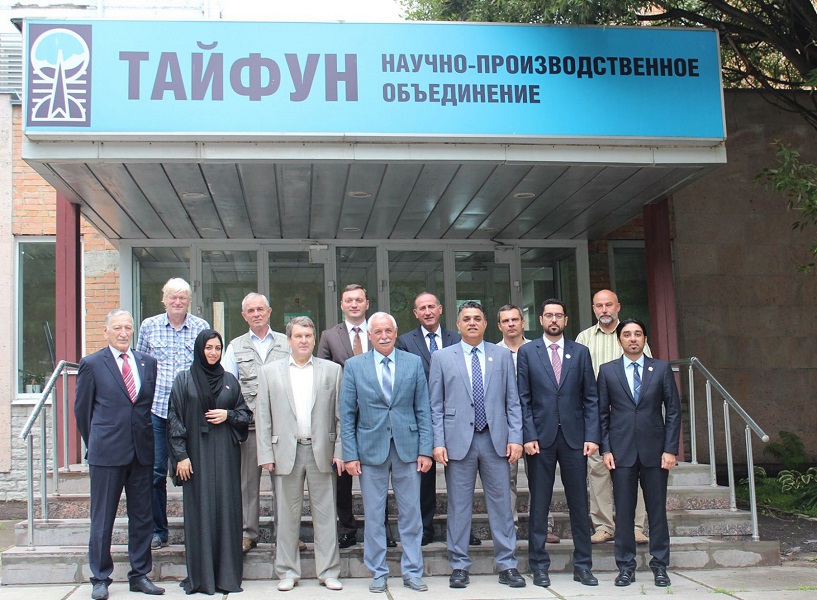UAE Research Program for Rain Enhancement Science wraps up successful roadshow visit to Russia
By Aliheydar_Rzayev Wednesday, 08 August 2018 11:58 AM

A UAE Research Program for Rain Enhancement Science roadshow has concluded a series of highly productive meetings at leading global research institutions and their scientists in the Russian cities of Moscow, St Petersburg and Obninsk.
Launched by the Ministry of Presidential Affairs of the UAE, and managed by the National Center of Meteorology (NCM), the UAE Research Program for Rain Enhancement Science’s active international engagement has already ensured its attaining a leading position in the global quest to address water security challenges through innovative scientific and technical research.
Dr Abdulla Al Mandous, the Director of NCM, said: “Our roadshow visits are of great importance to the UAE Research Program for Rain Enhancement Science. Through such engagement, we are seeking to establish close research cooperation with leading scientists around the world, inviting them to join UAE’s efforts to tackle the growing challenges of global water security. Moreover, through its ever-increasing global reach, the Program further demonstrates the UAE’s pioneering role in developing advanced water security solutions for the benefit of those at risk of water scarcity.”
The visits offered a valuable opportunity for the roadshow team to connect with scientists, researchers and technologists specializing across of a broad range of meteorological and hydrological sciences. Following a visit to the Lebedev Physical Institute of the Russian Academy of Sciences in Moscow, the team went on to meet with experts at the “Typhoon” Scientific and Production Association of the Russian Hydrometeorological Service in Obninsk, and the Russian State Hydrometeorological University and the Main Geophysical Observatory in St Petersburg.
A highlight of the roadshow was a meeting with a Third Cycle awardee of the Program, Dr Ali Abshaev, and his team at the Lebedev Physical Institute. In addition to receiving updates on the latest progress of Dr Abshaev’s research project, entitled “The Creation of Updrafts for the Formation of Artificial Clouds and Rainfall’, the team also witnessed a demonstration of “TESIS”, a set of solar imaging instruments deployed in space by the Russian spacecraft CORONAS-PHOTON in 2009.
Dr Abshaev, a Third Cycle awardee of the UAE Research Program for Rain Enhancement Science, is an Associated Professor at the Hail Suppression Research Center in Russia and Head of the Weather Modification Laboratory at the High Mountain Geophysical Institute of Russian Hydrometeorological Service. is leading a highly original research project aiming to stimulate convection and precipitation with energy derived from solar radiation absorbed by aerosols and the deployment of helium-filled balloons in cloudless conditions to heat specific atmospheric areas.
Alya Al Mazroui, Director of the UAE Research Program for Rain Enhancement Science, said: “We have been very pleased for the opportunity to share our results and achievements with the distinguished institutions we have visited in Russia, and are also very grateful for the hospitality we have received. The original research and monitoring being conducted by many of the scientists we met could significantly compliment the creative ideas currently being explored by our Program awardees. By continuously engaging with stakeholders around the world, we are encouraging the most innovative advances from leading researchers working in the field of rain enhancement.”
The UAE Research Program for Rain Enhancement Science’s worldwide outreach campaign has seen it connect with leading researchers and partners in the quest for global water security solutions. Since its inception, the Program has built a global network with more than 1200 researchers from over 500 prestigious scientific research institutions around the world, including the European Organization for Nuclear Research (CERN), the European Space Agency (ESA), and NASA.
The Program has also built enduring with numerous research and innovation centers in nearly 70 countries; these are drawn from a broad geographical distribution ranging from the United States to the UK and Germany in Europe to Thailand, China and Japan in East Asia. Other key global institutions engaged by the Program during its roadshow campaign include the United Nations, the European Commission and the World Meteorological Organisation (WMO).




























Add new comment